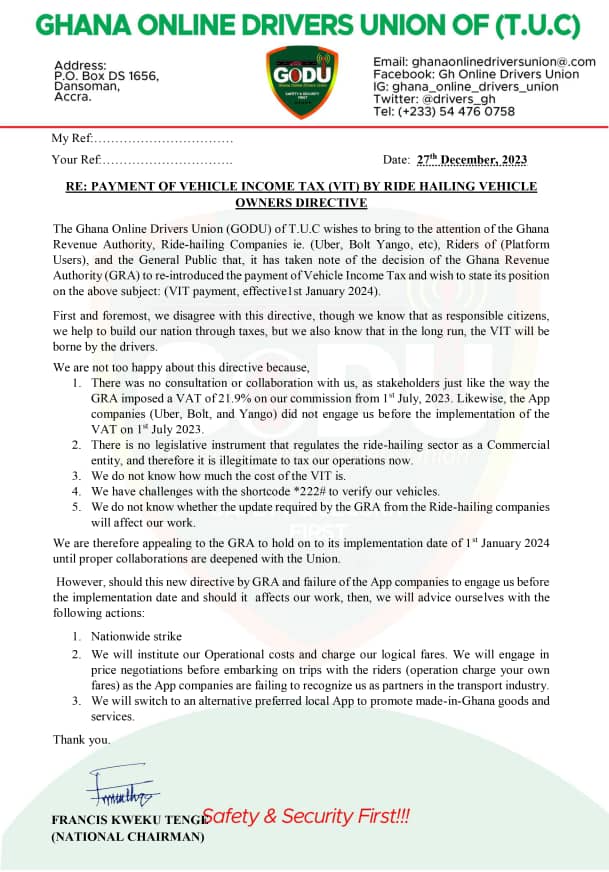
By Kingsley Webora TANKEH
A senior lecturer at the University of Ghana Business School, Prof. Patrick Asuming, has expressed concern over government’s silence on the proposed value-added tax (VAT) reform that will harmonise the complex tax policy to improve compliance and play a major role in fiscal consolidation efforts.
Speaking exclusively to Business and Financial Times (B&FT), the development economist said government’s missed September deadline has created uncertainty within the business community and threatens a key pillar of the revenue mobilisation strategy.
Prof. Asuming described the current VAT architecture as an irrational system where “similar businesses have some on the normal rate and some on the flat rate”. He said this is not sustainable and discriminatory, fuelling non-compliance.
The value added tax (VAT) is levied on products and services in the country. The VAT system comprises a standard rate, three levies and flat rates.
This includes a VAT standard rate of 15 percent, National Health Insurance Levy (NHIL) of 2.5 percent, Ghana Education Trust Fund (GETFund) Levy of 2.5 percent and COVID-19 Health Recovery Levy (COVID-19 HRL) of 1 percent, which are charged together and make complete VAT of 21 percent.
The VAT system also has 3 and 5 percent separate flat rates for small businesses and the real estate sector respectively. These are charged with only the COVID-19 Levy.
The VAT system also has zero, 7 and 12.5 percent withholding VAT rates.
The promised reform, which was captured in the 2025 Mid-year Budget Review, aims to flatten and unify these rates to improve compliance and efficiency.
“The current structure is quite difficult to understand. Simplifying it would be ideal,” Prof. Asuming stated, stressing that decoupling levies would result in a “tax on tax” – which he described as “unhelpful”.
Taxes influence behaviour, investments and business competitiveness. Some experts noted that the cascading effect of these levies scares investors away, impacts business operations and leaves businesses with no choice other than to pass down some of the cost to consumers.
The delay however compounds a systemic failure in rolling out the Electronic VAT (E-VAT) system. Prof. Asuming confirmed the system is “lagging behind” with businesses demonstrating reluctance to onboard, thereby rendering the policy ineffective in improving compliance.
“With VAT alone – if we improve our compliance from something around 60 percent to 90 percent, the revenue we can generate will solve a lot of our revenue problems,” he asserted, pointing to a potential 50 percent surge in VAT efficiency when the reforms are passed.
According to him, this will improve government revenue and augur well for fiscal consolidation.
Commissioner-General – Ghana Revenue Authority (GRA) Anthony Sarpong, speaking on the side-lines of the 2025 Deloitte Africa Tax Conference, acknowledged the impact of the VAT system’s complexity, saying consultations are far advanced to simplify the prevailing system.
“VAT is a big opportunity because all of us consume and drink. It’s important that we strengthen the process with technology. That way we can harness the opportunity.”
Prof. Asuming stated that implementing both the E-VAT and VAT reforms could turn the economy’s fortunes around.
However, he argued that much of the revenue is drained through tax exemptions – which the 24-hour economy also seeks to use as incentives for round-the-clock production.
“The bigger thing is with all the 20 exemptions that are built in, whether we are going to deal with that,” he said. He emphasised the transformative potential closing these loopholes will have on the economy, but expressed cautious optimism as to whether there’s the political will to do so.
Prof. Asuming also pointed to the structural weakness in public finance: failure to integrate the informal sector into the tax net. Prof. Asuming identified this as the “harder work” that will allow for lower tax rates across the board, without threatening fiscal consolidation.
He challenged the notion that it is difficult to rope the informal sector into the tax bracket, citing investments in digitalisation which he said are being underutilised.
“We’ve got to a stage where mobile accounts talk to bank accounts. The Ghana Card is required to register land and businesses. We are just getting them to connect,” he noted.
The recent 2024 Integrated Business Establishment Survey, he added, provides an updated business registry that should be leveraged for tax revenue mobilisation.
The post Delayed VAT reform threatens fiscal consolidation appeared first on The Business & Financial Times.
Read Full Story





















Facebook
Twitter
Pinterest
Instagram
Google+
YouTube
LinkedIn
RSS